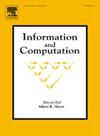宇宙学模型中的随机性假设
IF 1
4区 计算机科学
Q3 COMPUTER SCIENCE, THEORY & METHODS
引用次数: 0
摘要
由于非紧群没有不变的概率分布,因此非紧对称性不能被随机性完全打破。特别是,这使得“哥白尼式”在无限宇宙模型中对观察者位置的随机选择变得更加棘手。这个问题可以用拓扑学家所说的点空间来规避。然后,随机性将仅用于围绕预先指定的“观察点”构建(无限)模型,因此不需要随机选择。额外的复杂性来自于最初的随机性可能被隐藏起来。P. Gacs和a . kuucera证明了每个序列都可以由一个随机序列通过算法生成。但是Vladimir V'yugin发现随机算法可以以正概率生成无法计算的序列,这些序列在算法上不等同于任何随机序列。本文章由计算机程序翻译,如有差异,请以英文原文为准。
Assumptions of randomness in cosmology models
Non-compact symmetries cannot be fully broken by randomness since non-compact groups have no invariant probability distributions. In particular, this makes trickier the “Copernican” random choice of the place of the observer in infinite cosmology models.
This problem may be circumvented with what topologists call pointed spaces. Then randomness will be used only in building (infinite) models around the pre-designated “observance point”, that thus would not need to be randomly chosen.
Additional complications come from the original randomness possibly being hidden. P. Gacs and A. Kucera proved that every sequence can be algorithmically generated from a random one. But Vladimir V'yugin discovered that randomized algorithms can with positive probability generate uncomputable sequences not algorithmically equivalent to any random ones.
求助全文
通过发布文献求助,成功后即可免费获取论文全文。
去求助
来源期刊

Information and Computation
工程技术-计算机:理论方法
CiteScore
2.30
自引率
0.00%
发文量
119
审稿时长
140 days
期刊介绍:
Information and Computation welcomes original papers in all areas of theoretical computer science and computational applications of information theory. Survey articles of exceptional quality will also be considered. Particularly welcome are papers contributing new results in active theoretical areas such as
-Biological computation and computational biology-
Computational complexity-
Computer theorem-proving-
Concurrency and distributed process theory-
Cryptographic theory-
Data base theory-
Decision problems in logic-
Design and analysis of algorithms-
Discrete optimization and mathematical programming-
Inductive inference and learning theory-
Logic & constraint programming-
Program verification & model checking-
Probabilistic & Quantum computation-
Semantics of programming languages-
Symbolic computation, lambda calculus, and rewriting systems-
Types and typechecking
 求助内容:
求助内容: 应助结果提醒方式:
应助结果提醒方式:


